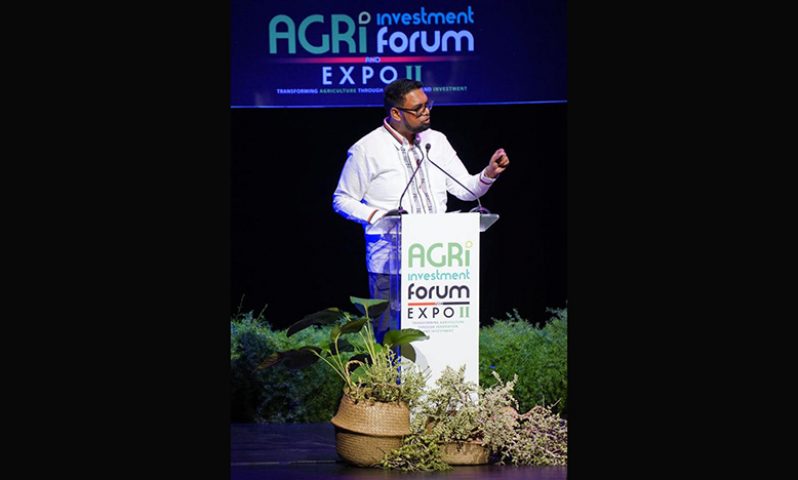–Production levels heightened in CARICOM countries
–Leaders reaffirm commitments
PRESIDENT Irfaan Ali on Friday signalled that it was time to do more than just talk about what can be done to advance the region’s goal for reducing the food import bill by 25 per cent by 2025.
The President made these remarks during his address at the opening ceremony of Trinidad and Tobago’s Agri-Investment Forum and Expo II, which is being held at the Queen’s Park Savannah.
During his address, Dr. Ali said the commitment by the region to the ‘25 by 2025’ goal is just a baseline, as the objective must go far beyond this commitment.
Acknowledging this, he noted that significant progress has been made over the past few months in the region, as he applauded the effort of the ministerial task force in pushing the agenda ahead.
As this taskforce has advanced works, President Ali highlighted some examples of the progress made within a number of countries thus far.
In Jamaica, President Ali said the country reached 26 per cent of their target with solid performances in onions and Irish potatoes.
For Trinidad and Tobago, Dr. Ali mentioned that there were strong performances registered in poultry, for which the target was 83,000 tonnes. Some 66,500 tonnes were produced as of June 2022.
The production levels in St. Lucia for fruits, vegetables, poultry and pork have surpassed targets set for June 2022, President Ali said.
By June of this year, he explained, production of fruits and vegetables had amounted to 1,000,309 tonnes. “This, of course, is indicative of the need of upward adjustment to the target,” Guyana’s Head of State stressed.
Emphasising the level of commitment made by Caribbean leaders to remove trade barriers between countries in the region, the sentiment is that the region is well on the way to achieving a freer, more fluid market.
Giving examples, Dr. Ali said the establishment of the Guyana-Barbados Food Terminal in Barbados is a demonstration of one such commitment. Similar discussions, he added, are ongoing with Antigua and Barbuda, Jamaica, Trinidad and Tobago, and the rest of the region.
The Head of State said that as production is bolstered at the national level, countries are also ensuring that there is easier access to regional markets.
Meanwhile, in Guyana, over the first half of the year, Dr. Ali explained, that there has been steady progress reported in every category, with notable work being done in self-sufficiency as it relates to corn and soya bean.
This, he said, requires capital investment of the rest of the region, and Guyana is ready for partnership with the private sector on that front.
Further, as it relates to poultry, Guyana has achieved a performance mark of 61 per cent. Meanwhile, the country has seen an overall attainment of 80 per cent of its set target as it relates to livestock.
Continuing on progress made regionally, President Ali said that Barbados is advancing its production and productivity with the use of technology.
And for the first time, Prime Minister Mia Mottley is leading a programme that will see the growth of aquaculture and further production before the end of the year in that country.
“It is no longer talking about what can be done; it is doing what we have been talking about for a very long time,” Dr. Ali exclaimed.
He expressed that “the time has come for us to demonstrate tangible results, as we seek to create an environment in this region, in which not only are we food secure, but we develop a sustainable and resilient path to food security.”
To foster this, he mentioned that CARICOM leaders are committed to ensuring that the shift occurs to ensure that there are changes to the institutions, infrastructure, and more to foster more trade within the region, and achieve the region’s food security goal.


.jpg)











